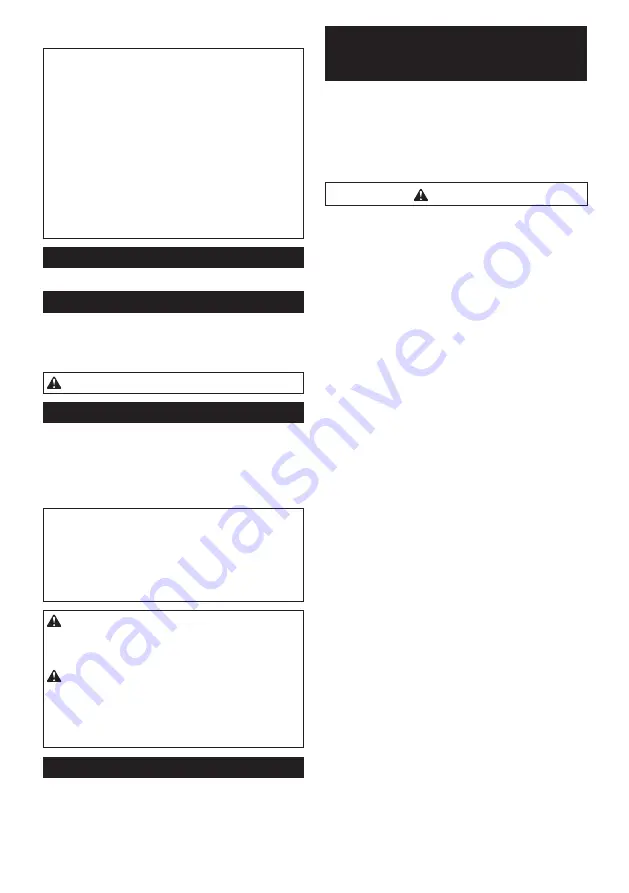
6
ENGLISH
SAVE THESE INSTRUCTIONS
Meaning of “caution” and “warning” indications
Caution:
Indicates a potentially hazardous situation
which, if not avoided, may result in minor
or moderate injury. This is also used to
alert against unsafe practices associated
with events that could lead to personal
injury.
Warning:
Indicates a potentially hazardous situation
which, if not avoided, will result in death or
serious injury.
*** Makita shall not be responsible for any inci
-
dental damages or personal injuries result
-
ing from negligence of Warnings and Safety
Instructions contained in the Instruction
Manual.
Intended use
The tool is intended for cutting rebar.
Noise
The typical A-weighted noise level determined accord-
ing to EN60745:
Sound pressure level (L
pA
) : 78 dB(A)
Uncertainty (K) : 3 dB(A)
WARNING:
Wear ear protection.
Vibration
The vibration total value (tri-axial vector sum) deter-
mined according to EN60745:
Work mode: impact tightening of fasteners of the maxi
-
mum capacity of the tool
Vibration emission (a
h
) : 2.5 m/s
2
Uncertainty (K) : 1.5 m/s
2
NOTE:
The declared vibration emission value has
been measured in accordance with the standard test
method and may be used for comparing one tool with
another.
NOTE:
The declared vibration emission value
may also be used in a preliminary assessment of
exposure.
WARNING:
The vibration emission during actual
use of the power tool can differ from the declared
emission value depending on the ways in which the
tool is used.
WARNING:
Be sure to identify safety measures
to protect the operator that are based on an estima-
tion of exposure in the actual conditions of use (taking
account of all parts of the operating cycle such as the
times when the tool is switched off and when it is run-
ning idle in addition to the trigger time).
EC Declaration of Conformity
For European countries only
The EC declaration of conformity is included as Annex A
to this instruction manual.
IMPORTANT SAFETY
INSTRUCTIONS
•
The “important safety instructions” described
below should always be followed to reduce the
risk of a fire, electric shock, and personal injury.
•
Before operating the machine, read and carefully
follow these instructions.
•
This manual should be retained for future
reference.
WARNING
1. Before use, read this Instruction Manual
thoroughly.
2. Use only the charger and battery specified in
this Instruction Manual.
·
Any combination, except that specified in this
manual, may cause injury or damage due to
explosion.
3. Charge properly.
·
Use this charger only with the rated AC power
supply. Do not use booster transformers or vehicle
generator, or use the charger to supply DC power.
Incorrect use may cause overheating and fire.
·
Do not charge the battery at a temperature under
10°C (50°F) or more than 40°C (104°F) as this
may cause an explosion or fire.
4.
Do not short-circuit the pins of the battery.
Avoid storing battery in a container with other
metal objects such as nails, coins, etc. This
may cause overheating, fire and explosion due
to short-circuit.
5. Guard against an electric shock.
·
Do not touch the power plug with a wet or damp
hands as this may result in an electric shock.
6. Consider the work area environment.
·
Do not expose the charger and battery to rain or
use them in damp or wet locations, as this may
cause overheating or electric shock.
·
Keep the work area well lighted. Working where
there is insufficient light may cause an accident.
·
Do not use or charge the battery where there are
flammable fluids or gases, as this may cause
explosion or fire.
7. Wear Safety Glasses and Protective Clothing
·
Always wear eye protection, dust mask, non-skid
safety shoes, helmet and any other mandated
or necessary protective clothing while using this
equipment. Failure to do so may result in injury.
8. Prevent unintentional starting.
·
Ensure the switch is in the off-position before con-
necting to power source and/or battery pack, pick-
ing up or carrying the tool. Carrying power tools
with your finger on the switch invites accidents.
9. Secure the work.
·
Use clamps or a vice to hold the work. This frees
both hands to properly hold, control, and operate
the tool. Failure to properly secure the work may
result in injury.
Summary of Contents for DSC251
Page 3: ...3 1 Fig 8 1 Fig 9 1 Fig 10 1 2 3 4 5 8 6 7 Fig 11 1 Fig 12 1 Fig 13 ...
Page 4: ...4 1 Fig 14 ...
Page 177: ...177 ...
Page 178: ...178 ...
Page 179: ...179 ...







































